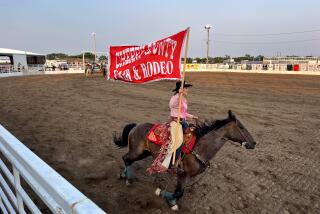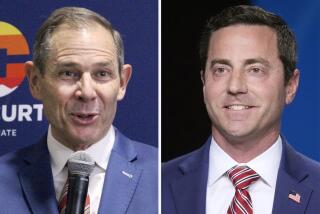Clinton May Play the Spoiler in S. Dakota : Campaign: Primary had been billed as a showdown between Kerrey and Harkin. But the Arkansas governor carries populist appeal.
- Share via
SIOUX FALLS, S.D. — Ever since two farm-state Democrats entered the race for President, South Dakotans have had a ready name for their second-in-the-nation primary: “The Battle for the Heartland.”
Here on the state’s frozen plains, they said, the Feb. 25 contest would be a showdown between the two Midwesterners--Iowa Sen. Tom Harkin and Nebraska Sen. Bob Kerrey. Local Democrats figured their contest--coming just one week after the nationally spotlighted New Hampshire primary on Feb. 18--would play a decisive role in advancing one campaign and dismissing the other.
Both Harkin and Kerrey took up the challenge and opened offices in Sioux Falls within days of their campaign announcements early last fall. But then about two months ago, things changed a bit.
On a cold and windy night in a horse barn 10 miles outside Sioux Falls, South Dakota Democrats gathered for the biggest steak fry in their history and to hear speeches from Harkin, Kerrey and a newcomer, Arkansas Gov. Bill Clinton.
Clinton was the last speaker; he didn’t climb onto the podium of hay bales until 11 p.m. But after a rousing speech in which he told the crowd of more than 1,000 that they “should be angry” at government for failing to effectively address the country’s domestic problems, many in the crowd were clearly impressed.
“There is a strange populist streak in this state and those were the chords he touched,” said Kathy Piersall, a Sioux Falls attorney who was the event’s emcee and later became a Clinton supporter.
“Before the steak fry, there was no great interest by the Clinton campaign in South Dakota and then suddenly, there was a real grass-roots movement that wasn’t whipped up by any advance team,” she said.
Clinton spokeswoman Dee Dee Myers said that as a result, “There are a lot of people in the state who are encouraging us to compete there. It would always be nice to beat your opponents in their own back yard.”
Myers said campaign officials have not yet decided whether to launch a full-fledged challenge in South Dakota. But earlier this week, the campaign opened a new office in Sioux Falls to explore the idea.
With Clinton having emerged as the early front-runner in the Democratic race, some of his South Dakota supporters believe he could take a big step toward the party’s nomination by beating two of his top opponents on their own turf.
The risk, however, is that he could also give a boost to either Harkin or Kerrey if he takes them on and does poorly.
Since Clinton already looks like a solid contender for third place in the state, one Sioux Falls Democrat said: “He’d only come in here if he thought he could win it.”
The potential for a high stakes presidential race is new for South Dakota. The state Legislature approved an early primary just five years ago and, in the first test in 1988, the vote was partly overshadowed by the Minnesota primary on the same day.
This time, however, a combination of factors in the Democratic presidential race have raised the state’s visibility.
For one, the Iowa caucuses on Feb. 10 are not playing their traditional early role of narrowing the candidate field because virtually no challenge has been launched there to native-son Harkin. This development has heightened the focus on New Hampshire, which in turn has given South Dakota a more prominent place on the election calendar. The state’s primary is the only one in the two weeks following the New Hampshire vote.
There also is the attraction of a duel between the two next-door senators that some locals have dubbed “the death dance.”
“South Dakota has the ability to make or break Harkin or Kerrey,” said Steve Erpenbach, executive director of the state Democratic Party. “It could finish the campaign for one of them.”
There has been no polling of South Dakota’s 180,000 Democrats. But earlier this month, the first phase of the state’s delegate selection process gave some indication of candidate strength.
More than 500 Democrats filed to become delegates and signed up for their favorite candidate. Kerrey registered 207, Harkin got 165 and Clinton 89. Former California Gov. Edmund G. (Jerry) Brown Jr. had 20 prospective delegates and Larry Agran, the former mayor of Irvine, Calif., got 16.
Former Massachusetts Sen. Paul E. Tsongas, who has been concentrating his efforts on New Hampshire, has ignored South Dakota. He did not register any prospective delegates, making him ineligible for some of the state’s support at the party’s national convention.
On the Republican side, conservative commentator Patrick J. Buchanan sought to press his challenge against President Bush in South Dakota, but he was blocked by the state party. State Republican leaders refused to place Buchanan’s name on the ballot because his Dec. 10 campaign announcement came eight days after their deadline for ballot consideration.
That leaves Bush’s name as the only one that will appear on the GOP ballot.
Buchanan filed a lawsuit demanding that his name be included on the ballot, but last week a state judge rejected the claim. There has been no word from the Buchanan campaign about whether it will appeal.
Ironically, it was the Republican dominated Legislature that pressed for the early primary in hopes of generating interest among its party’s voters.
Skirmish in South Dakota
South Dakota’s second-in-the nation primary on Feb. 25 has loomed for several months as a showdown between the two neighboring politicians seeking the Democratic presidential nomination: Iowa Sen. Tom Harkin and Nebraska Sen. Bob Kerrey. But now, pressure is building on Arkansas Gov. Bill Clinton to launch a full-fledged effort in the state as well. All figures as of October 1990 Population: 696,004 Registered Voters: 420,351 Democrats: 180,181 Republicans: 207,036 Registered Independents and others: 33,134
Source: South Dakota Secretary of State
More to Read
Get the L.A. Times Politics newsletter
Deeply reported insights into legislation, politics and policy from Sacramento, Washington and beyond. In your inbox three times per week.
You may occasionally receive promotional content from the Los Angeles Times.










